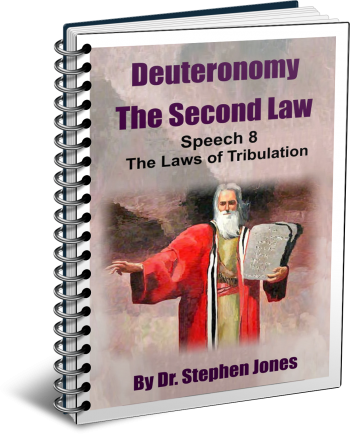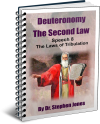Latest Posts
View the latest posts in an easy-to-read list format, with filtering options.

A commentary on the eighth speech of Moses in Deuteronomy 27-28. The book of Deuteronomy is a series of 12 speeches that Moses gave just before his death at the end of Israel's wilderness journey.
Category - Bible Commentaries

When Moses speaks of locusts and crickets, he is speaking not only literally but metaphorically as well, because the prophetic history of Israel shows that the locusts are actually foreign invaders. For this reason, Moses moves naturally from the topic of locusts in Deut. 28:42 to “aliens” in verses 43 and 44.
43 The alien who is among you shall rise above you higher and higher, but you shall go down lower and lower. 44 He shall lend to you, but you shall not lend to him; he shall be the head, and you shall be the tail.
It was God’s intent that aliens would come to learn of His ways and to adopt the culture of the Kingdom of God. For this reason, God also commanded the Israelites to love the aliens as themselves (Lev. 19:34) and to afford them equal justice. In this way, when the aliens saw the benefits of the law and its way of life, they would all want to adopt it for themselves as well.
Israel failed to achieve that way of life advocated in the divine law, but in the end Isaiah foresaw the day when this goal would actually become a reality (Isaiah 2:3).
The failure of Israel to apply the laws of the Kingdom equally and to adopt God’s way of life turned the aliens from being a blessing to being a curse. It is self-evident that if aliens wished to live in the Kingdom of God, they had to follow His law (Num. 15:16). In other words, aliens must “swear allegiance” to King Jesus (Isaiah 45:23), in order to receive equal rights as citizens of the Kingdom.
In ancient times, the Israelites themselves repudiated whatever laws they did not like, and misinterpreted many of the laws that they retained, thus setting a bad example for the aliens in their midst. The Israelites adopted the ways of the other nations. Instead of the aliens learning the ways of God, they brought their own laws and culture with them. God saw to it that their ungodly practices gave them an advantage over the Israelites, so that the aliens gained wealth and power, while the Israelites were brought lower and lower into debt.
It is clear from Scripture that the unbelieving aliens were not the problem. The problem is always attributed to the rebellious Israelites. So in all the examples of Israel’s captivities in the book of Judges, God “sold” the Israelites into the hands of foreign nations because of sin.
In Judges 3:8 God “sold them into the hands of Cushan-rishathaim king of Mesopotamia.” After eight years the people repented, and God then raised up a deliverer to set them free. However, a generation later Israel again adopted the ways of other nations. In Judges 3:12 we read,
12 Now the sons of Israel again did evil in the sight [view, opinion] of the Lord, so the Lord strengthened Eglon the king of Moab against Israel, because they had done evil in the sight of the Lord.
After being oppressed for some years, Israel again repented, and so God again sent a deliverer. However, in each succeeding generation the Israelites fell into the same violation of their covenant with God. So once again, we read in Judges 4:2, “And the Lord sold them into the hand of Jabin king of Canaan.”
In Judges 6:1 God delivered Israel into the hands of Midian for seven years. This particular captivity is most relevant to our present study, because here, for the first time, Scripture compares the Midianites to locusts. Judges 6:4-6 says,
4 So they would camp against them and destroy the produce of the earth as far as Gaza, and leave no sustenance in Israel as well as no sheep, ox, or donkey. 5 For they would come up with their livestock and their tents, they would come in like locusts for number, both they and their camels were innumerable; and they came into the land to devastate it. 6 So Israel was brought very low because of Midian, and the sons of Israel cried to the Lord.
In all of Israel’s captivities, God never once blamed the aliens for being too powerful or oppressive. He always laid the blame upon the Israelites for doing “evil,” that is, for violating His law and for adopting the culture of non-Kingdom nations. It is evident that the Midianites in the example above did not come into the land of Israel to learn the ways of God, but to plunder the wealth of the Israelites.
When the Israelites finally “cried to the Lord,” God did not immediately respond by sending them a deliverer, as He had done in the first few captivities. This time God sent a prophet to give them a history lesson, beginning in Judges 6:8, to remind them of the fact that God had delivered them from Egypt. The implication is that God had redeemed Israel from slavery in Egypt, and the law of redemption said that the redeemed slave was to serve his redeemer (Leviticus 25:53). Hence, Israel needed to recognize God’s right as their Redeemer and submit to His authority.
God then raised up Gideon to deliver them. Isaiah points to this deliverance story as being prophetic of a future deliverance from “the Assyrian.” Isaiah 10:26 says,
26 And the Lord of hosts will arouse a scourge against him [prophetic Assyria] like the slaughter of Midian at the rock of Oreb….
Isaiah was referring to Gideon’s battle in Judges 7:25,
25 And they captured the two leaders of Midian, Oreb [“raven”] and Zeeb [“wolf”] , and they killed Oreb at the rock of Oreb, and they killed Zeeb at the wine press of Zeeb, while they pursued Midian; and they brought the heads of Oreb and Zeeb to Gideon from across the Jordan.
Gideon’s battle was launched in a prophetic manner. After trimming down the army to a proper size of just 300 men (Judges 7:8), they fought the immense coalition with trumpets, jars, and torches. The men of Israel were to blow the trumpet, then break the jars in their hands which exposed the torches (light). This prophesied of the day when the autumn feasts would be fulfilled, first the feast of Trumpets (resurrection), then the great Day of Atonement (repentance, breaking the earthen jars), and finally the feast of Tabernacles (light, manifestation of the sons of God).
There were six captivities of Israel, each ending with a “Judge” who delivered them after they repented. These serve as examples and warnings to us today that such captivities are brought about by our rebellion against God and His law. They show us that our captivity was not caused by the great intelligence of the evil rulers of the world, but by the rebellion of God’s people. Hence, the solution is not to go on a crusade against the evil ones, infidels, or heretics, but to repent of our own lawlessness.
The evil ones are like locusts. If you kill a few locusts, there are always plenty more to take their place. If we were to make war against the present-day Babylonian rulers, God would raise up men to take their place who are even worse than the ones that were killed. Neither should we blame the aliens for coming to America illegally in great numbers. Most of them are just looking for a better life, because they too have suffered under Mystery Babylon in their own countries. They do not know that they are being used by the Babylonian leaders for their own evil purposes.
Neither do they know God’s purpose. God’s purpose for bringing in non-Christian people—or Christians who do not know Kingdom culture—is first to bring judgment upon the church in America. Secondly, however, it is to cause the church to repent. When they repent, God will cast out any unrepentant Babylonian oppressor. When they repent, then the Spirit of God will make all of these “illegal aliens” a blessing to us, for they too will receive the Promise of the Father and be filled with the Spirit. They will then have the desire to learn the ways of God and to submit to the laws of God and His way of life.
Remember that locusts play a dual role in prophecy. They can be a curse when God’s people are lawless; but they can also be a blessing, because locusts are clean food (Lev. 11:22). Of John the Baptist we read in Matt. 3:4,
4 Now John himself had a garment of camel’s hair, and a leather belt about his waist; and his food was locusts and wild honey.
Locusts were considered “clean food,” so it is possible that John actually ate them. However, it is more likely that this is a reference to the carob pods that came from the locust tree.
“In North America and Greece the term ‘locust’ (gr. akris) was applied to the pods of the carob tree, that somehow resemble the insect. By extension many other pod carrying trees have been called ‘locust tree’.”
http://en.wikipedia.org/wiki/Locust_tree
Just as locusts themselves can prophetically represent people, so also the pods from a locust tree can prophetically represent locusts themselves. So John was nourished by locusts, and John came “in the spirit and power of Elijah” (Luke 1:17). His mission is given in the previous verse, Luke 1:16,
16 And he will turn back many of the sons of Israel to the Lord their God.
He came with a message of repentance to prepare the way of the Messiah. He was physically sustained by locusts. In John’s day, the Romans had come in like locusts, along with Greeks, Syrians, and Samaritans, setting up colonies in the land. John did not tell the locusts to repent, for they were not the real problem. Instead, he fed on locusts, and because we are what we eat, John was identifying with those locusts while leading Judah to repentance. Furthermore, as a representative of the Kingdom, John was absorbing those alien “locusts” into the Kingdom of God as they repented.
We understand from the law, the prophets, and the New Testament that the Messiah must come twice, first of Judah and secondly of Joseph (Ephraim). Of necessity, then, there must also be a second Elijah ministry comparable to that of John that is designed to prepare the way for the Messiah’s second coming.
There are, however, a few alterations, because the purpose of the two comings of the Messiah are different. The Messiah first came of Judah to claim His scepter. The Messiah comes the second time as Joseph-Ephraim to claim His birthright. So also there is a difference in the two Elijah ministries. In fact, the biblical pattern shows that Elijah’s mission, having been cut short, was completed by Elisha under the double portion of the anointing. John himself was said to be “Elijah,” but the overcomers today as a whole are called to an Elisha ministry to prepare the way for Christ’s second coming.
It takes the double-portion ministry of Elisha to prepare the way for the double-portion ministry of Yeshua, the Ephraimite, because Ephraim (Efrayim) means “double fruitfulness.” It was Joshua the Ephraimite who brought Israel into the Kingdom.